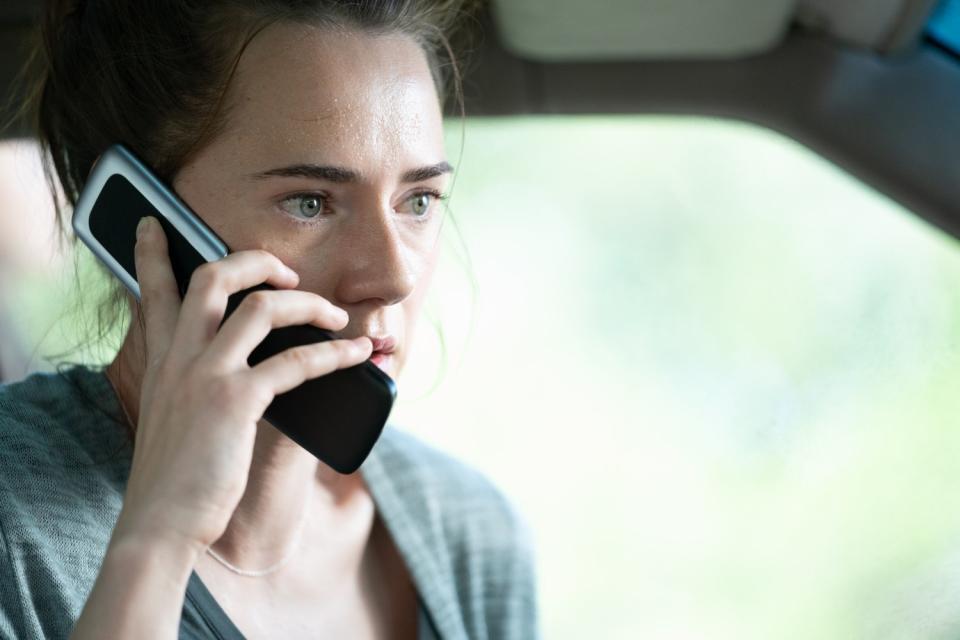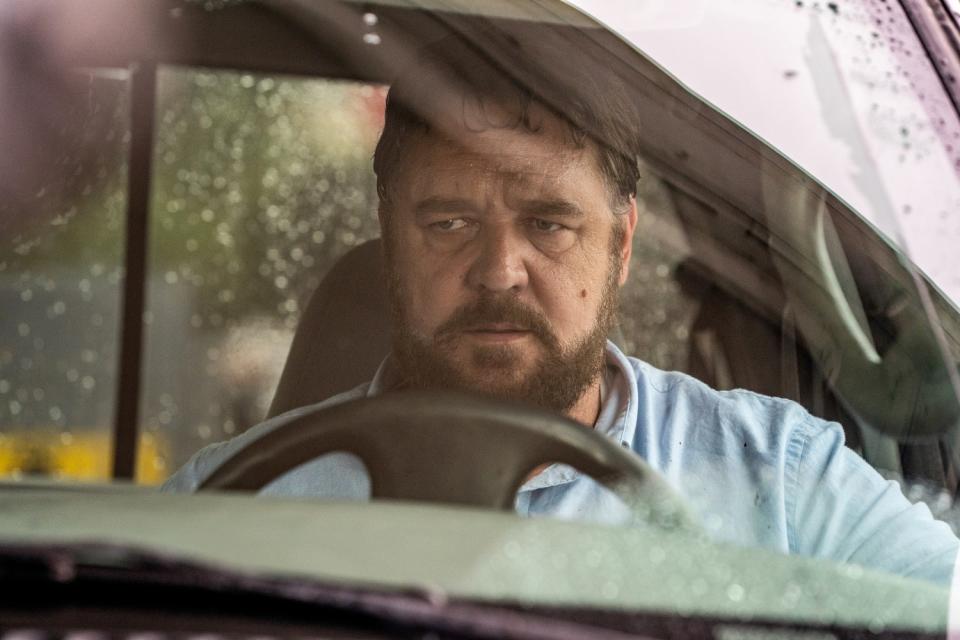Review: A rampaging Russell Crowe plows into reopened theaters with crude, disposable 'Unhinged'

The Los Angeles Times is committed to reviewing new theatrical film releases during the COVID-19 pandemic. Because moviegoing carries inherent risks during this time, we remind readers to follow health and safety guidelines as outlined by the CDC and local health officials. We will continue to note the various ways readers can see each new film, including drive-in theaters in the Southland and VOD/streaming options when available.
In the crudely sadistic schlock-o-rama “Unhinged,” Russell Crowe spends the better part of 90 minutes behind the wheel of a giant pickup truck, driving like a demon and killing like one too. His role is listed in the credits as “The Man,” which seems rather generous; it would be more accurate to say he’s impersonating a very raw, very angry side of beef, a wrecking ball made flesh.
The Man’s latest unfortunate quarry is a driver who ticks him off at an intersection one morning, and whom he decides to punish in the most painfully protracted manner possible. One way or another, he will see to it that she regrets her offense. He will extract his apology. He will make her eat Crowe.
Sorry, that was unnecessary. So is “Unhinged.” Mechanically directed by Derrick Borte (“London Town”) from a script by Carl Ellsworth (“Red Eye,” “Disturbia”), the movie — a nasty little PSA on the perils of road rage, the necessity of seat belts and the disposability of extras — is most notable for having attempted to exploit a health crisis to its own commercial ends. Already playing in theaters abroad, it has the dubious distinction of being one of the first new movies to open in American theaters since the onset of the COVID-19 pandemic, an ostensible selling point that its distributor, Solstice Studios, has been crassly touting for months.
Given the eagerness to be first out of the gate, it seems only fair to treat “Unhinged” as an early test case, to subject it to a moral and practical inquiry that film lovers will surely be conducting for the next several weeks and months: Is this movie worth risking your life to see? Much like the poor couple we see being murdered by The Man in the tightly framed opening scene, the question can be dispensed with swiftly. Since I couldn’t in good conscience recommend that you go to a theater even for a great film, I can’t begin to imagine a rationale for venturing out to see “Unhinged.”

Fortunately, if you insist on watching an Oscar winner slumming it and flooring it, mowing down innocent bystanders and sending giant trucks careening across a jammed freeway, you may do so in the relative safety of one of the drive-in venues where “Unhinged” will also be playing nationwide. Even so, proceed with caution and steer clear of parking-lot altercations: There could be no more freakily appropriate venue for a picture in which the stranger in the next car might turn out to be be a fugitive arsonist and ax murderer, lying in wait for the target of his next lethal grudge.
And as we can see from that hack-’em-up, burn-it-down prologue, Crowe’s character can hold a grudge and then some: He has no scruples, no inhibitions and no apparent concern about whether he survives his reign of terror. That makes him a singularly unfortunate person for our harried heroine, Rachel (Caren Pistorius), to engage in a rush-hour rumble. A soon-to-be-single mom whose frequent tardiness has just cost her a steady hairdressing gig, Rachel is in a bad mood herself when she winds up stuck at a green light behind that giant pickup.
What happens next can be summed up in a series of cautionary warnings: Don’t honk your horn aggressively. Don’t lower your window when a creep beckons you to do so — a lesson that Rachel tries and fails to impart to her young son, Kyle (Gabriel Bateman), in the back seat. Don’t stop for gas and leave your phone unattended so the creep can steal it and raid your contacts for their own personal hit list. Don’t answer the phone the creep has left in its place, allowing him to taunt you incessantly like the psycho villains in “Speed,” “Phone Booth” and other noteworthy examples of homicidal-rampage cinema.

Viewers can of course supply their own lessons. Don’t get too attached to the supporting cast. (The actors include Austin P. McKenzie, Lucy Faust and Jimmi Simpson.) Pay attention to any and all seemingly irrelevant chitchat, especially in the opening scenes, which will supply perfect narrative payoffs for the knock-down-drag-out endgame. Try to forget the pileup of clichés and enjoy the actual pileups, nimbly shot by Brendan Galvin, whipped into a frenzy by Mike McCusker, Steven Mirkovich and Tim Mirkovich (the Oscar-winning trio of editors on “Ford v Ferrari”) and amped up still further by David Buckley’s killer-bees-humping-a-Land-Rover score.
Pistorius, doing her best as a character with a giant “Kill Me” sign attached to her bumper, shrewdly refuses to make Rachel too readily sympathetic or conciliatory a protagonist. (Personal frustrations and frazzled nerves aside, she appears to be a genuinely terrible driver, judging by her habit of going on her phone and treating the freeway shoulder like her own personal carpool lane.) The most bracing thing about Rachel is her stubborn refusal to cough up the apology that her stalker keeps demanding. Some might think she could have saved herself a lot of grief by saying “I’m sorry” a lot sooner, but that dead look in the killer’s eyes — and the history of violent misogyny that emerges in brief flashes and slashes of backstory — gives the lie to such logic.
Despite its bullet-point nods to toxic masculinity and some glib armchair sociology about the rage-fueled society we have become, “Unhinged” doesn’t have much on its mind. Its sharpest subtext derives from the casting of Crowe himself, whose malevolent glare and low, insinuating growl are scarily believable here, even as they suggest a self-conscious dig at his own past persona. It’s been 15 years since the notorious phone-hurling incident that fueled his reputation as a celebrity rageaholic — a reputation that he has since done his part to dismantle with public displays of contrition and, over the years, a less brooding, more playful screen presence. If you saw his excellent turn in this year’s outlaw western “True History of the Kelly Gang,” you know that Crowe can embrace the light as well as the dark. If you haven’t, you can watch it now — at home.

